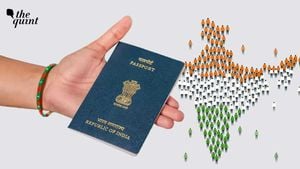North Korea's recent involvement in the Russia-Ukraine war has raised eyebrows across the globe, as reports indicate the dispatch of thousands of North Korean soldiers to Ukraine to bolster Russian forces. South Korea's National Intelligence Service has indicated there are about 10,000 troops expected to engage directly, with pay rates and resource deals drawing serious attention. These developments illuminate the complex interplay between military alliances and the dire needs of North Korea amid its long-standing economic struggles.
According to various reports, each North Korean soldier sent to Russia will earn around $2,000 per month, translating to over $200 million annually for the regime if these figures hold true. South Korean officials assert this strategic military engagement not only focuses on financial gain but also reflects political calculations as North Korea positions itself more closely with Russia.
Wi Sung-lac, who previously served as South Korea's ambassador to Russia, has noted the potential benefits for North Korea, especially concerning sizable agricultural support from Russia. Past collaborations have seen food aid from Russia, amounting to between 50,000 and 100,000 tons at times. Recent estimates suggest North Korea could potentially receive around 600,000 to 700,000 tons of rice, supplementing its insufficient domestic agricultural output.
This deal between Moscow and Pyongyang is thought to be financed not just through troop deployment but also by North Korea's arms trade, including the reported sale of artillery shells to Russia. These military supplies may alleviate some of the food shortages back in North Korea, combining strategic military support with basic humanitarian needs.
Interspersed with concerns from neighboring nations and international bodies, the deployment of North Korean troops marks unprecedented participation by the rogue state on the European battlefield. Ukrainian officials have reported incidents where North Korean troops stationed near the border have already faced combat. Ukrainian Foreign Minister Andrii Sybiha urged European leaders to take decisive action against North Korean involvement, emphasizing the gravity of the situation where North Korean troops are aiding Russia against Ukraine.
Critics of this military alliance observe the wider ramifications such collaborations may bear on both national and international security, especially pertaining to fears over potential technology transfers between Russia and North Korea. Officials from South Korea and the European Union have voiced their apprehensions, arguing these moves could significantly bolster North Korea's nuclear and missile capabilities.
The United Nations Secretary-General Antonio Guterres has also expressed serious concerns over the reports of North Korean troops being directly involved, calling for heightened scrutiny and decisive action by the international community. Guterres insists the world must respond vigorously to any escalatory moves from this volatile regional alliance.
While the prospects for North Korea seem intertwined with tactical military enhancements through Russian support, some analysts suggest the longevity of this partnership could be contingent on the outcomes of the Ukraine-Russia conflict itself. The Institute for National Security Strategy, aligned with South Korea’s intelligence community, warns of the potential for Pyongyang to lose value to Russia should the conflict wind down.
Observers are acutely aware of the intertwined fates of North Korea and Russia amid shifting global dynamics. Should economies recover and relationships reset post-conflict, North Korea's position could become precarious. With deepening sanctions isolative to North Korea from traditional allies like China, this dependence on Russian military collaborations could become its double-edged sword.
Historically, North Korea’s military decisions have been strategic, often with the intent to gain leverage over international sanctions or political quagmires. The current crisis is no different, as North Korea solidifies its alliance with Russia, seeking not only military support but also geopolitical leverage amid uncertain conditions ahead.
Public backlash is brewing, as evidenced by protests demanding the withdrawal of North Korean troops from Russia, stressing the need for peace and stability within Europe and the Korean Peninsula until diplomatic solutions can be reached. Observers fear the incurable entanglement of North Korea and Russia may lead to unforeseeable consequences concerning military and economic cooperation.
Future policy roles and defense strategies will certainly shift as global power dynamics evolve and pivot under the weight of North Korea's military involvement. And with leaders from both Europe and Asia urging restraint and diplomatic resolutions, the call for dialogue is more pressing than ever as nations grapple with the consequences of these new alliances.



